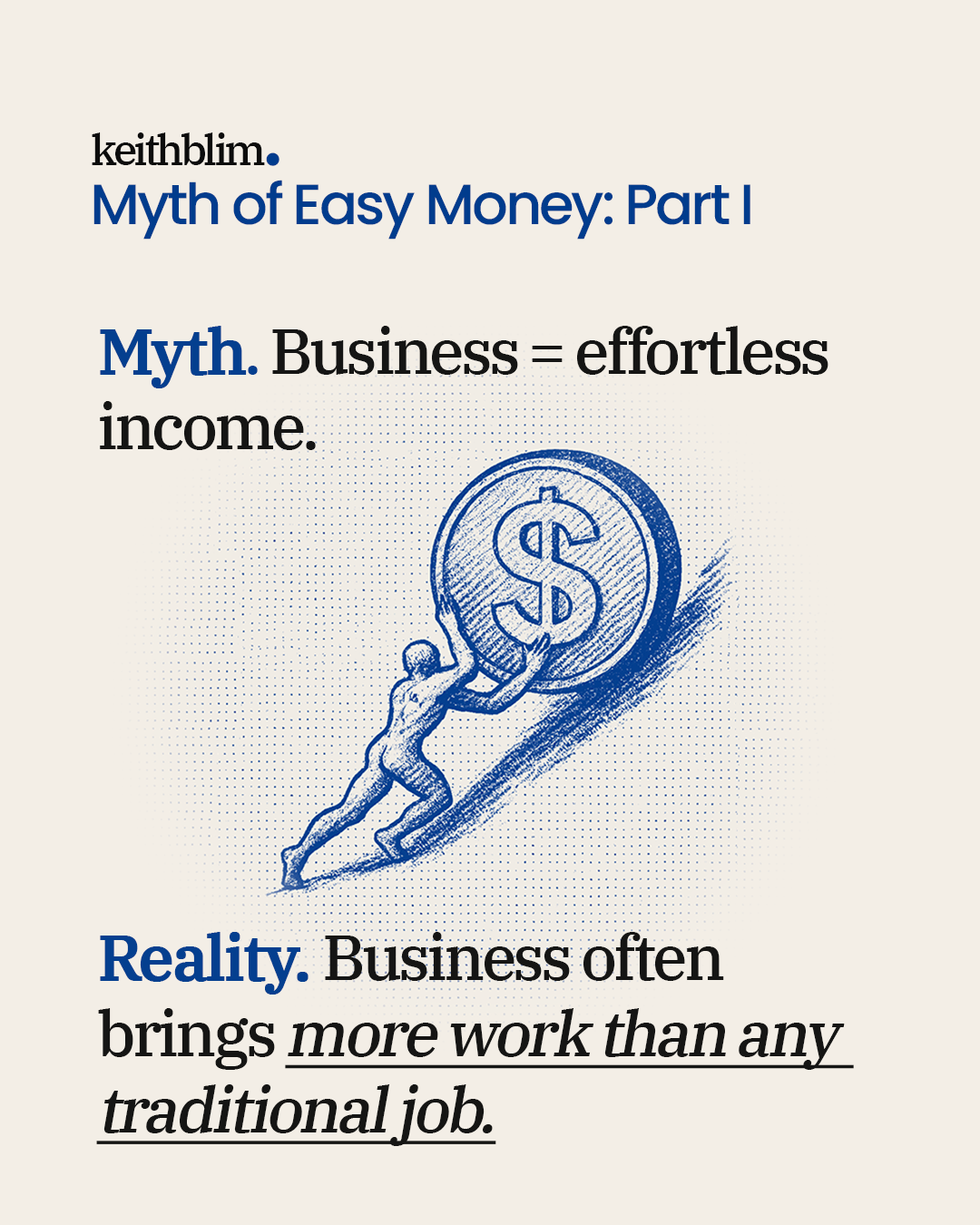Business and the Myth of Easy Money (Part 1: Defining Business)

About This Series
There's a misconception that starting a business is a sure way to make more money for less effort compared to working a job.
Supposedly, if you just quit your job and start a business, within a very short time, you'll make millions and be able to play golf all day and travel in luxury for the rest of your life. You will never need work again, and your bank account will grow on its own through passive income.
The best part? You'll build your dream business with even less effort than it takes to work your office job. It’s so easy! Everyone should start a business, and nobody should work jobs!
I call this the "Myth of Easy Money".
This series is mainly for people who were tricked into believing this myth. I’ve seen some very bad results come out of this belief. If I can prevent just one person from taking rash action because of this lie - saving them from months (or years) of difficulty - then this series will have done its job.
For those who don’t believe in this myth, however, I hope this series can still help you think more clearly about business-related decisions, especially around maximizing your wealth and the balance between active and passive income.
This series will have 3 articles:
- Part 1: Defining Business
- Part 2: Misconceptions About Business
- Part 3: The True Benefits of Business
These articles will approach the topic from a purely resource-based perspective (i.e., money, time, and effort). I will not discuss more subjective factors like enjoying the combination of freedom and responsibility that going into business entails.
For this series, I'll be using "Business" and "Entrepreneurship" interchangeably to mean starting and operating a business from scratch as its CEO. Common examples include opening a cafe, selling goods on e-commerce platforms, and running your own law firm. This is in contrast to more passive forms of business ownership like owning shares of a corporation.
With that out of the way, let's begin.
What are the different ways to make money?
The average person thinks of making money using 3 categories:
- Work a job/side hustle
- Start a business
- Invest in various assets like stocks, real estate, etc.
While these categories seem to make sense, I’m going to propose that business does not belong on this list.
To understand why, let's define the word "business".
What is a business?
A business is a bundle of assets and resources organized to create goods and services for customers in exchange for payment. This is done to generate revenue at a profit.
For example, a restaurant needs employees, kitchenware, and so on:
The restaurant needs these resources to function. If it doesn’t have the resources required to serve food, then it can’t function as a restaurant.
How would you gather these resources?
To start a restaurant, you would have to make Investments to gather the required resources. You'd buy the kitchen, set aside money for rent, and so on.
Aside from Investment, you would also have to put in Work. As an entrepreneur, you'd need to do the job of the restaurant manager - calling suppliers, overseeing construction, hiring employees, and so on.
With that in mind, let’s modify the initial diagram to account for how you’d acquire the restaurant’s resources:
Notice something interesting about this diagram?
Most people think that the three categories of money-making are Work, Business, and Investments.
However, upon closer inspection, a Business is nothing more than a composite of Work and Investments.
The two categories of money-making
There are only two ways to make money: Work and Investment. You can combine these two elements and call it a "business", but at the end of the day, it's all just various configurations of Work and Investment.
Work is any income-generating activity that requires your time.
Investment is any income-generating activity that requires your assets.
Business is just any vehicle that bundles Work and Investment together.
Businesses have different blends of Work and Investment.
For some businesses, Work generates most of the revenue. For other businesses, the Investments bring in the cash.
You can eliminate almost all of the Work by making the business dependent on Investment. This is the key to passive income.
For example, a mall makes most of its money from Investments in real estate, while a physical therapist makes most of their money from services:
The accessibility of a passive income setup depends on the type of business you have. A famous motivational speaker who relies on speaking events will have a difficult time removing herself from her business because customers pay to listen to her specifically. On the other hand, landlords don't need to be the ones fixing up their properties, and they can easily pay for someone else to do repairs for them.
Passive income is not inherent to business, and passive income is not free. You pay for your passive income through Investment in profit-producing assets. This increases your expenses, reducing your income. You’re literally trading money for time.
Passive income is not unique to entrepreneurship. The same dynamic is seen when an employee makes Investments in profitable assets, quits their job, and lives off the assets’ cash flow. In both cases, you just swap Work for Investment as an income source.
Business is not comparable to Work
The Myth of Easy Money tends to show itself when people compare incomes: "Here I am working hard as a manager, making 100,000 pesos a month. That business owner over there has an easier life than me and they're making millions!"
This comparison makes absolutely zero sense. The employee's Work without Investment is being pitted against the business owner's combination of Work and Investment:
It's like comparing a martial artist against someone with a gun. The martial artist will always lose because his opponent has a weapon. No wonder people fall for the Myth of Easy Money!
To make a fair comparison, we must consider the employee's Investments. If the employee had a similar amount of income-generating assets such as stocks or real estate, would the income gap still be that huge?
Business only seems financially superior to employment because of a flawed methodology: We’re not accounting for the employee's Investments.
A VP of a large corporation with a stock portfolio will likely earn more than a business owner with a single french fry stall by the street. A lawyer with real estate investments will likely make more money than a landlord with the same amount of real estate.
Business is not inherently superior to employment.
Conclusion (To be continued)
Through this article, I hope you've started to doubt the Myth of Easy Money - the idea that business will always create more money for less effort compared to employment.
Work and Investment are the only two ways to make money. Work requires your time, while Investment requires your assets. Business is nothing more than a combination of Work and Investment - it does not exist independently as a third way of making money.
Because business is a combination of Work and Investment, it is illogical to compare an employee's salary with a business owner's income, because the employee's Investments are missing in this comparison.
I still have much to say about this topic. You can read the next part here: Business and the Myth of Easy Money (Part 2: Misconceptions About Business)



